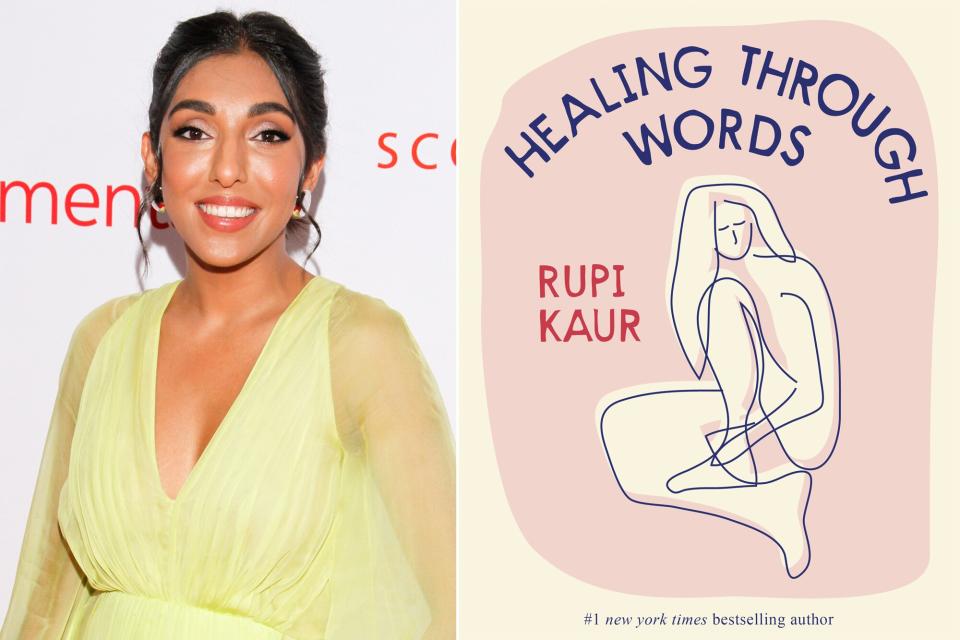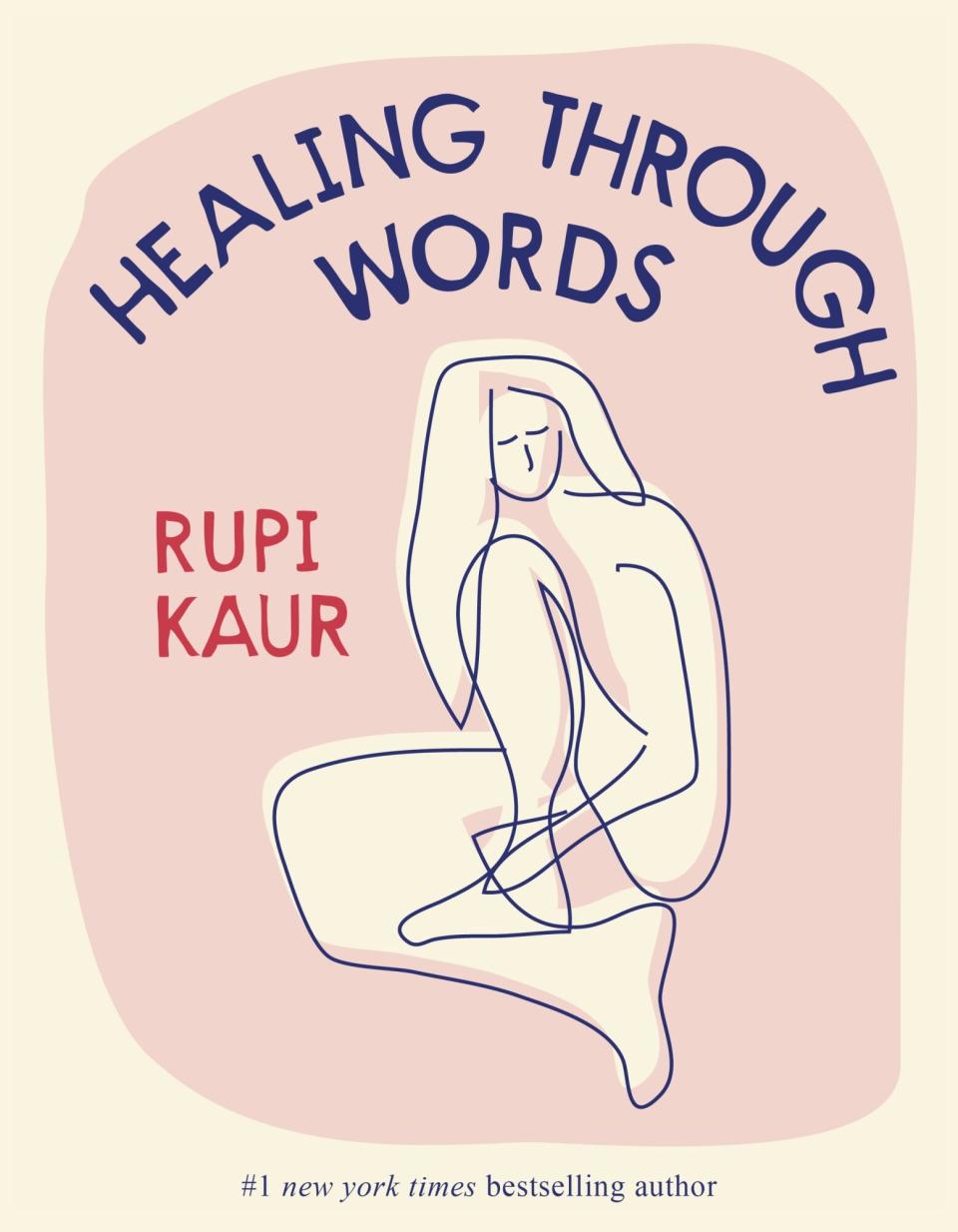Poet Rupi Kaur on her upcoming writing book: 'It's meant to send readers on a journey of self-exploration.'
- Oops!Something went wrong.Please try again later.
Unapologetically outspoken and honest, Rupi Kaur has connected with millions of readers. Her first two collections of poems, 2014's milk and honey and 2017's the sun and her flowers both became #1 New York Times bestsellers. In those books, she shares her unfiltered thoughts on everything from feminism to femininity, love and loss, life and its the curveballs — and her fans love it: Kaur has a devoted following of 4.5 million on Instagram, where she shares both her poems and the array of chic stage outfits she wears on her current world tour.
She's back exploring the hurting, the loving, the breaking, and the healing, but this time she's inviting you to do the same with her new book, Healing Through Words, available for pre-order now. Kaur, 29, spoke with EW about free writing, misconceptions surrounding poetry, and how everyone can be creative.

Jeremy Chan/Getty Images; Simon & Schuster
ENTERTAINMENT WEEKLY: This book is a series of educational exercises. It's very interactive and it's meant to help the reader/writer heal through their own writing. What was your inspiration for creating this book?
RUPI KAUR: Well I've written three books, but sometimes I think my readers think it's really easy and I never get writer's block, but that's not true. I feel like my first book was the easiest one to write because I had nothing to sort of live up to. I didn't think I wanted to even be a writer. I was just doing it for fun. And then when I went to pursue the second book, I was hit with so much pressure and just felt so creatively blocked. I searched for tools for writing to help me overcome those writing block periods and make writing easier. And I just couldn't find those tools out there. And so I started creating this book, then eventually I realized that, wait a minute, I'm not writing this book for me. I'm writing it for all of my readers. Because they're always asking me what my writing process is, how I overcome writers block, my tips, my tricks. In Healing Through Words, I share all of my secrets and hopefully lay down the pathway for them to feel inspired and creative. Sometimes finding inspiration and getting creative is work. So hopefully I've been able to take that work out by creating these exercises and made it easier on the person who's approaching the book.
You have a quote at the beginning of the book that says, "Want to know what makes me sad? When someone tells me they're not creative." Can you talk about that?
I think that there's a certain urge inside so many of us, most of us, to be creative and to express, but unless we've been doing it already for a long time, or since we were young, there's almost like this shame. That makes me sad because I'm like, who told you you're not creative? It's an idea that I've seen and heard so many times, you can be logical or you can be creative, but you can't be both. And if you've already set yourself on the logical path, whatever that means to you, whether that means you are pursuing accounting or being a lawyer, you permanently shut the door on your creativity. I think that's not true at all. And creativity is innate in all of us because we are alive and we are human. Creativity is what has allowed us to survive a millennia.
Let's discuss the free writing process. What's the benefit of free writing versus writing with quality or narrative in mind?
For me, the goal of free writing is coming up with my first draft. I find in my case, if I approach an empty page and before I even start writing say this is what I want to write about today, I need it to be five pages long and have this rhymed theme, I feel like I've already pigeonholed my creativity. There could have been a potential that I write this beautiful poem about a totally different theme and it could have been potentially the best thing I ever wrote, but I'm not going to write it because I already put myself into a box. And so free writing, that's how I like to approach my daily writing. Exhaling and just starting wherever my mind is and let my subconscious sort of take me on the road of what theme I need to be writing about.
You say that poetry is so much more than what we're taught in high school and that anyone can write a poem, even if they're not a writer. What do you think is the biggest misconception about poetry?
I was taught what poetry is through school, but I also have the privilege of having a whole different non-Western culture and heritage that taught me poetry. So when I was taught in school that it has to be this type of rhyme scheme, there has to be stanza and you have to write a title, that was the opposite of what my culture taught me. Poetry was in my community. Poetry was accessible. It is something that is intergenerational, something that grandmothers and grandchildren and everybody in between can gather around in a circle and everybody is empowered to sing it and to write it and to create it in that specific moment. And I find that in the west, it is definitely much more classist, in terms of what kind of poetry is real literature and what kind of poetry is not. I feel like the biggest misconception is that there are rules to play by. We're living in a global world where we redefine what poetry means to us.
What do you hope readers will take away from this book and their experience with free writing?
I am equally excited and equally nervous, which I guess are kind of the same emotion. I used to run a lot of writing workshops throughout the past 12 years in person for small intimate groups. I never did them virtually, but then when COVID happened and everybody was isolated, I think I was desperate to feel connected. Because I was in the process of writing my third book and for me I need to feel connected to something outside of myself to feel inspired. So I started running these free Instagram Live writing workshops where sometimes they were over an hour long and consistently there were 7 to 12 thousand people with me on those workshops, completing all the exercises. And I never knew it before that moment, but that was the year that I realized so many of my readers used writing as a form of self care. I hope that this book serves at a source of continuing those workshops. I think it will take readers on like an endless road of self exploration. I am using the book myself to write my next selection of poetry, which is really nice and such a relief because here's nothing harder than starting a new book. I hope that by the end of Healing Through Words readers maybe have their first collection of songs or a play or a collection of poetry.
Have you already come across fans and readers that have said you've inspired them to write poetry or to begin their writing journey?
Yes, especially on this tour, I came back home with like a shelf of books. I wasn't expecting that, but like so many of my readers gifted me the book of poetry they self-published. I'm really excited to see now with Healing Through Words, being so intentional in terms of hopefully supporting them through their writing journey, I'm excited to see the books that will come out next.
In Healing Through Words, you ask readers to delve deep into their emotions, like hurting, loving, breaking, and healing. What advice do you have for someone who could benefit from this book and start their healing process, but are a bit afraid to jump in and let those deep thoughts and emotions run free on the page?
I think one of the most important tips is there's no rules for how to do this. You don't have to start from the beginning to end. You can open the book, start wherever you want, and if you start reading an exercise and you're like already feeling anxious, why do you have to complete it? Just turn the page and come back to it later. I want this process to feel safe and very fruitful. This book is yours and I really try to be intentional about saying that it's yours. That's why there's all this space to write. And so I hope that folks will give themselves that time and space.

Healing Through Words by Rupi Kaur
You created the illustration on the cover of the book. What is the meaning behind the cover art?
home body was my third book and so much of that book is about my struggles with mental health, depression, anxiety, and disassociation from myself and how I found my way back home to my body. I would say one of the most popular pieces in that book is about self and evolving. It's about being here right now and enjoying the person I am today because the person I am tomorrow is not going to be this woman. And so it was really trying to inspire people to be in the present moment and enjoy whoever you are right now. The illustration of that poem is a little drawing of a woman who's sitting in that position. That poem, that was my north star when writing Healing Through Words. I wanted the cover to look like it's belonging to a family with my other book covers. I do believe that writing has the power to heal you because especially when you're writing about tough personal experiences. I feel like Healing Through Words is really the sort of the guardian and that's why it's a bigger book. It's the guardian overlooking all the collections of poetry.
Related content:

